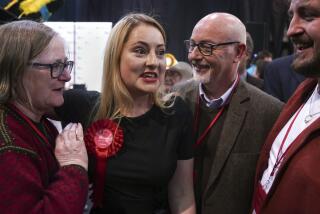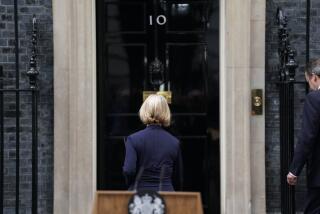Edward Heath, 89; British Conservative Prime Minister
- Share via
Edward Heath, the former prime minister who brought Britain into what is now the European Union but later lost his party’s leadership to Margaret Thatcher, died Sunday. He was 89.
Heath died at his home in Salisbury in southern England. The cause of death was not reported, but Heath had been in failing health since 2003 when he suffered a pulmonary embolism.
“In every sense [he] was the first modern Conservative leader,” Thatcher said of her former rival in a statement. “We are all in his debt.”
British Prime Minister Tony Blair called Heath “a man of great integrity and beliefs” and said “he will be remembered by all who knew him as a political leader of great stature and importance.”
Heath was born in Broadstairs, Kent, on July 9, 1916. His father was a carpenter and his mother worked as a maid. He went to Oxford on a music scholarship but also studied politics, philosophy and economics. While there, he became active in student politics and was elected president of Oxford Union, the noted debating society.
He gained his first experience in Conservative Party politics in 1938, when he helped elect a parliamentary candidate who was opposed to the appeasement policies of Prime Minister Neville Chamberlain in dealing with Adolf Hitler.
After college he joined the army in the early days of World War II. Assigned to the Royal Artillery, he rose to the rank of lieutenant colonel and saw action in Europe.
After the war, Heath held several jobs, including editor of a church newspaper, while pursuing a career in politics. Without the private income of most Conservative Party candidates, Heath worked as an investment banker years after establishing himself in politics.
In 1950, he was elected to Parliament from Bexley, Kent. When the Conservatives under Winston Churchill regained power in 1951, Heath was appointed to a junior position in the government. Two years later, he was put in charge of maintaining party discipline in the post of chief whip, a position he held until 1959.
He gained a seat in the British Cabinet in 1959 when he was appointed minister of labor in Harold Macmillan’s government.
The early 1960s were years of transition for the Conservative Party as the older generation of leaders that included Macmillan, Anthony Eden and Alec Douglas-Home were passing from the scene.
Heath was one of several leaders who vied to take their place. Generally viewed as a moderate, he was interested in Britain’s joining the European Union, then called the Common Market. As lord privy seal, a senior foreign ministry post, he conducted negotiations to bring Britain into the market, only to have French President Charles de Gaulle veto it in January 1963. In rejecting the bid, De Gaulle criticized Britain’s close economic and military ties to the United States.
Two years later, Heath was elected head of the Conservative Party. At 49, he was the party’s youngest leader in nearly a century and the first to be chosen by members of Parliament rather than by private consultation among party members.
Heath lost his first bid for prime minister to Harold Wilson in 1966, but four years later he gained a narrow victory over Wilson.
Heading into office, Heath said his goal was to revitalize the British economy so that the country could deal with the United States and the Soviet Union as an equal.
The key part of that effort was getting Britain into the Common Market. To that end, he reached agreement in 1972 with French President Georges Pompidou. A year later Britain joined the European Community.
Membership in the Common Market was not accepted by all within Britain. Many Labor Party members as well as Conservatives vowed to reverse the move. The issue was settled in 1975, when the Labor government put it before the voters in a referendum. Common Market membership was overwhelmingly approved, and the controversy died at that point.
Other aspects of Heath’s economic policies were less successful. In his first year as prime minister he attacked business and labor for inefficiencies and claimed to be willing to let flailing companies fail. But in 1971, he bailed out Rolls-Royce when the legendary British automaker was threatened with bankruptcy, and the move did little to help his credibility in dealing with the wage demands of labor unions.
That same year, British policy in Northern Ireland also became an issue for Heath. After an increase in sectarian violence, he ordered a crackdown on members of the outlawed Irish Republican Army. In January 1972, on what would become known as Bloody Sunday, British troops fired into a crowd in Londonderry, killing 14 protesters, most of them Catholic. Britain then took over direct rule of Northern Ireland.
The economy continued to be a major problem.
The October 1973 Arab-Israeli War forced a hike in the price of oil, and Britain faced a winter without enough fuel. Coal miners demanded wage increases from Heath as well as an end to overtime hours. Facing economic chaos, Heath declared a state of emergency in December 1973, and the British economy went on a three-day workweek.
In February 1974, coal miners voted a work stoppage, and Heath dissolved Parliament and sought a vote of confidence for his policies in dealing with the economy. He lost to his longtime rival Wilson in a close parliamentary race. But Wilson’s government was not successful in solving Britain’s problems either, and Wilson called another election for October 1974. Heath campaigned on a national unity platform but lost to Wilson again.
After leading the Conservatives to three defeats in the previous four elections, Heath faced a stiff challenge within his party by those who felt his leadership was ineffective, his ideology too open-minded. Thatcher defeated him in February 1975 and became leader of the Conservatives.
His poor relationship with Thatcher cost Heath much of his influence in the Conservative Party. Indeed, during Thatcher’s 15 years as party leader, Heath’s name seemed to disappear from party folklore. The 1987 election manifesto, for instance, described the history of Conservative policy toward Europe without mentioning Heath.
He retained his seat in Parliament and served until October 2000, when he announced that he would not run again. Heath served in the House of Commons for 50 years, having been elected and reelected 14 times.
Despite his blue-collar upbringing, Heath cultivated several upper-crust interests. He was a first-class concert organist and conducted orchestras in Britain and on the Continent.
He took up yachting at age 50 and won Australia’s Sydney to Hobart Race. He was also chosen to captain Britain’s Admiral’s Cup Team in 1971 and 1979.
His 1976 book “Music: A Joy for Life,” was a best-seller. “Sailing: A Course of My Life,” a memoir, was similarly well-received.
Heath never married, and he told reporters that he enjoyed his own company. “I don’t think I ever regret not getting married. A lot of politicians seem to regret they’ve got wives.”
In 1992, he became Sir Edward, a member of the country’s most prestigious order of chivalry, the Knights of the Garter.
His funeral is scheduled for July 25 at Salisbury Cathedral.
More to Read
Sign up for Essential California
The most important California stories and recommendations in your inbox every morning.
You may occasionally receive promotional content from the Los Angeles Times.












